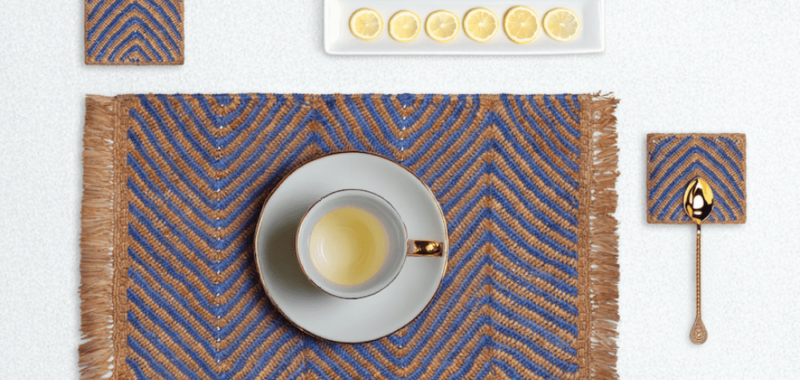MILAN — Made for a Woman, the Madagascar-based indie label launched in 2019 by Eileen Akbaraly, has made its official debut in home décor.
The brand, which is known for its raffia-based creations, has developed a capsule collection for multibrand design retailer Interni.
The range includes coasters, placemats, runners, baskets and poufs, all handcrafted from raffia in the brand’s atelier in Antananarivo. Pieces nod to nature in their colors and are inspired by the underwater world and mythology in their names, ranging from the Euribia basket to the Nettuno pouf.

Pieces from the Made for a Woman x Interni home décor capsule collection.
Courtesy of Made for a Woman
Overall, geometric patterns and shapes dominate the line, spanning from rectangular and elliptical placemats to oval and hexagonal poufs.
Available exclusively at Interni’s online store, the capsule collection retails at prices ranging from 22 euros for a coaster up to 1,160 euros for poufs.

A pouf from the Made for a Woman x Interni home décor capsule collection.
Courtesy of Made for a Woman
Akbaraly teased the project to WWD earlier this year, after having tiptoed into the home décor segment with a few upcycled pieces, woven chairs, patterned pillows as well as one-of-a-kind, made-to-order maxi carpets in the past.
The Interni partnership is only the latest in a streak of tie-ups for the young Italian-Indian designer, who has been garnering attention from big names in the fashion industry with her brand. This is due to its accessories and ready-to-wear collections imbued with vibrant colors and joyful vibes; its raffia expertise and artisanal production, and, most importantly, the overall socially and environmentally responsible business model Akbaraly implemented in the country where she grew up.
Such a combination of elements encouraged the likes of Fendi to partner with Akbaraly earlier this year, when a second collaboration with Chloé also dropped and Made for a Woman pop-ups rolled out at international department stores.

Baskets from the Made for a Woman x Interni home décor capsule collection.
Courtesy of Made for a Woman
Defined more as a social entrepreneurship project than a fashion label, Made for a Woman empowers local communities from vulnerable and disadvantaged backgrounds and promotes female craftsmanship in one of the poorest nations in the world.
Started with an atelier of 15 people, the brand’s factory now employs more than 350 artisans, 95 percent of whom are women. The company works with local organizations to reach women in at-risk environments — such as single mothers, survivors of gender-based violence and domestic abuse, sex workers and people with disabilities — and provides them with the professional training and crochet classes. It additionally gives its artisans free access to health care, medication, hygiene supplies, contraception, therapy sessions, legal consultancy as well as language courses and financial literacy classes.

Pieces from the Made for a Woman x Interni home décor capsule collection.
Courtesy of Made for a Woman
The brand works with a range of local partners and certified suppliers for its prime raw material, too. A staple of Malagasy culture and fully biodegradable in less than 15 years, raffia is dyed with organic colorants from coffee grounds and tea leaves or bolder natural pigments. Scraps from the manufacturing process are repurposed in an upcycled collection of accessories dubbed Rainbow as well as donated to local non-governmental organizations.

A pouf from the Made for a Woman x Interni home décor capsule collection.
Courtesy of Made for a Woman

